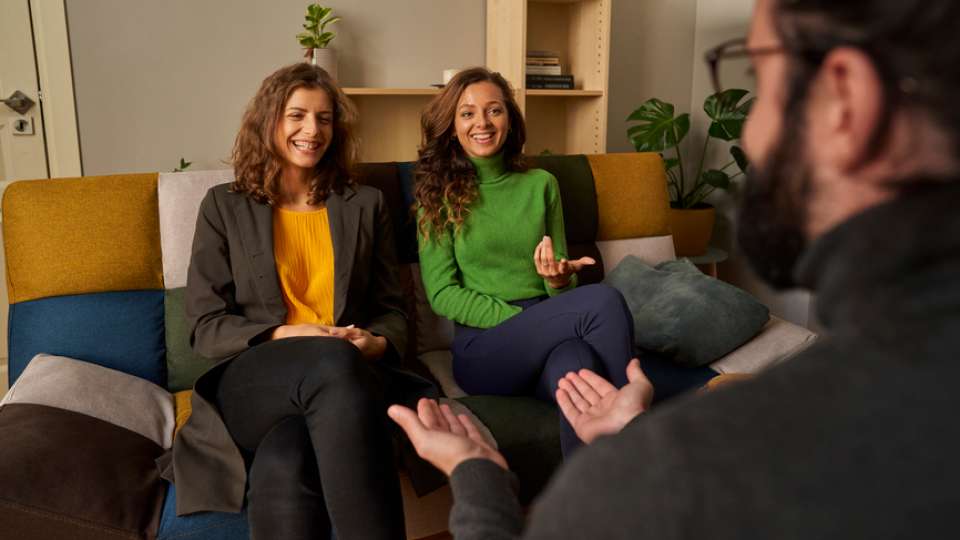
Against popular belief, a relationship doesn’t need to be in trouble to start going to therapy. But for many, the idea of couples therapy can sound scary. Alone and vulnerable in a room with your partner, your therapist and your thoughts? Thanks, but no thanks.
Despite the daunting feeling, it might be exactly what a relationship needs to grow, improve communication and become healthier.
What are the benefits of couples therapy?
Whether a relationship is slowly emerging out of the honeymoon phase or in its 20th year of marriage, there will be something to talk about in couples therapy. Life is consistently in flux between stressful moments and joyful ones, and any partnership will feel the effects of that. Even if the relationship feels good, it’s important to have skills at hand to support your partner — and yourself — when the going gets tough.
How to pick a therapist
Pepper Schwartz, professor of Sociology at the University of Washington, says that the journey starts during the therapist selection process. Schwartz is also an author of 16 books on love and relationships, has been profiled in many notable publications and has been seen on popular TV shows such as Married at First Sight.
“Does the therapist have a cognitive behavioral, Freudian, or other approach?” Schwartz says. “What does their therapy process look like? Do they give practical suggestions, or do they mostly let the couple feel each other out while they guide the conversation?”
There’s no right answer to these questions, but it’s good to discuss with your partner while you’re searching for a therapist. Schwartz adds that the therapy won’t be effective if one or both partners feel like the therapist might have a “favorite,” or if the communication styles don’t match up with the needs of the couple.
“Before you begin, you need to see how the therapist works and if they’re a good fit for you,” she says.
What’s a common indicator that it’s time to go to couples therapy?
While an abundance of conflict is not needed for couples to start therapy together, it is oftentimes the main indicator that it’s time for an intervention. According to Schwartz, this may appear in the form of frequent arguments, doing activities that don’t align with the other partner or feeling out of touch with each other.
“Couples in need of therapy can often feel like they’re ships passing in the night,” she says. “There might be a strained connection and a lack of joy.”
If this feels familiar, you’re in a very normal spot. Distress within a relationship can feel uncomfortable and threatening, but many couples enter periods of conflict that test their relationship. Even considering therapy with your partner is a great first step in acknowledging the need for change. It’s also a clear demonstration of self-care for both you and your relationship’s well-being.
However, there doesn’t need to be conflict to go to therapy with your partner — it’s common for couples to go to therapy when their relationship is strong to continue building on the existing foundation.
Couples may also go to therapy to process life changes such as a move, changes in employment, the birth or loss of children or other types of grief or stress.
“A lot of couples feel renewed, more in touch, listened to and feel like they can do better and solve problems again after therapy together,” Schwartz says. “Couples are also able to connect more intensely or get something off their chest that needed the support of a professional to feel safe enough to reveal the information to their partner.”
Why is it so scary to go to therapy with a partner?
Unfortunately, fear is a big deterrent for couples to start therapy together. Even when you spend your life with someone, it’s still difficult to be vulnerable and allow them to see parts you may have not given them access to in the past.
Fear and anxiety are valid when it comes to going to therapy with your partner. Schwartz confirms this, highlighting that many people are scared their partner might bring up something in therapy that they feel they can’t handle.
“They’re afraid that things might get worse,” she says. “There is a risk with that, especially if they’re in the hands of an unskilled therapist. A positive result from therapy doesn’t mean that the relationship or marriage will hold or that everything will be fixed. A positive result is reflected through a therapist who can keep the couple talking to each other in a constructive way so no unnecessary damage occurs.”
How long should a couple go to therapy together?
So, you’re convinced. It’s time to go to therapy with your partner. How long should you go for? What’s considered an effective timeline?
“It really depends,” Schwartz says. “Couples should go to therapy as long as they’re getting something out of it. It’s one of those natural things that attenuates if you feel there’s no longer a need. Some people like going and will continue to talk, but if you feel you’ve gone as far as you can go, or really great things have developed, then it’s likely time to stop.”
How to ask your partner to start couples therapy
Asking your partner to start couples therapy can be a hard first step, and could cause conflict in itself. Your partner might raise a variety of concerns that could deter you from going.
“It can be expensive, which isn’t a small thing,” Schwartz says. “It can also stir stuff up, even if it’s not stuff about each other. It can be memories or trauma from childhood or your past. You have to feel strong enough to deal with whatever may come up.”
Despite the difficulties that may arise within the relationship through these hard conversations, in the end, any couple can benefit from time with a therapist. Suggesting the idea to go to therapy together can be hard, but could be encouraging to your partner if you frame the experience in a positive way.
“When suggesting the idea to your partner, it’s good to recognize the issues, such as lack of effective communication, or the desire for enrichment in the relationship by talking about your priorities,” Schwartz says. “I would suggest saying that you are more ambitious about your marriage or relationship than just letting yourselves argue, and that you’re wanting to talk to someone and see if there are any tips to get things better than what they are.”

 Healthy ideas for your inbox
Healthy ideas for your inbox





